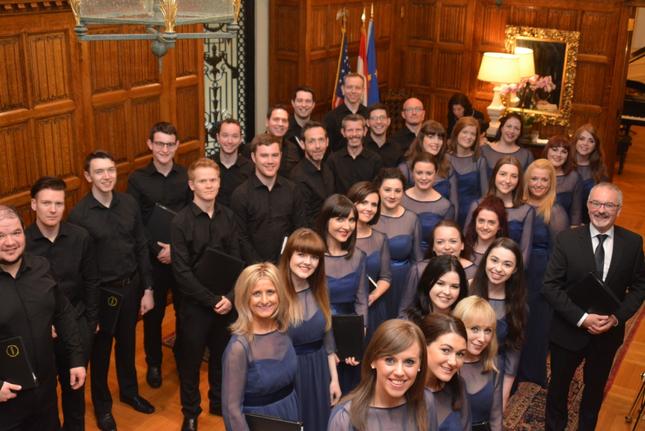A Weekend of Musical Moments
By • May 26, 2016 0 980

It’s fair to say that we live in uncivil, intemperate times — in terms of our political discourse, in terms of the comments sections on our little screens, in terms of the way we conduct ourselves in public, on our highways and in the halls of government.
Being polite, having good manners (or just manners) doesn’t soothe the savage beast.
But music still can. There are still places and times — in a concert hall, in the drawing rooms of embassies — where people gather together and listen to the music and converse, before, in between and after, often without devices lighting up the night.
Music can be a balm and a joy, depending on the occasion. At the embassy of the Grand Duchy of Luxembourg, it was a joy when the Embassy Series and its founder Jerome Barry helped orchestrate a fond farewell May 20 for Ambassador Jean-Louis Wolzfeld, who will be leaving as well as retiring later this summer, after a successful four-year tenure here.
Wolzfeld represented his tiny country in a big way, with curiosity, open arms, a warmth that was never pushy and an intelligence that was never showy. At special events, be they an evening of cabaret music or a yuletide celebration, he was the genial host.
Naturally, they feted the ambassador of a duchy where Belgians, Germans, the French and the Flemings gather convivially with an evening of Irish music and musicians — principally the pianist Barry Douglas, founder of the chamber orchestra Camerata Ireland, noted for its membership of musicians from the north and south of Ireland, and conductor Dónal Doherty and his chamber choir Codetta, young singers based in Derry.
A song by Schubert led things off, but the offerings were notably Irish, including music by James MacMillan, as well as the infectious “Little Man in a Hurry” and renderings of traditional works like “The Coolin,” “Carrickfergas” and, of course, always, “Danny Boy.”
The singers — later joined by the school-aged group Harmony North — filled the available room in the embassy to the hilt, so that soloists could probably be heard on Massachusetts Avenue, but the teeming, high-energy, impeccably meshed young voices were all of a piece to be savored.
The final salute came as both guests and artists gathered together in one room. It was decided that perhaps an American spiritual might punctuate the evening in high style, and it did indeed, with impeccable singing from the voices scattered throughout the room.
Codetta, Harmony North and Douglas all appeared at the Kennedy Center the following day as part of the “Ireland 100” festival.
Schubert, who led off the evening at Luxembourg, provided the same service May 21 at the Kalorama residence of the Ambassador of Iceland Geir H. Haarde and his wife, Inga Jona Thordardottir. It was another Embassy Series concert of far different kind, tempo and feeling. Violinist Laufey Sigurdardottir, who was born and raised on Reykjavik, and pianist Beth Levin deftly and with a balanced fierceness played Schubert’s “Violin Sonata No. 2 in A Minor.” Their intense performance called for equally intense listening. One needed to catch one’s breath and pay close attention to grasp phrases and ideas. In the stylish, brightly lit residence, surrounded by expressionist art, one felt a few steps removed from the oft-noted alarums of the world.
A violin sonata by Grieg preceded the fireworks of Beethoven’s “Violin Sonata No. 7 in C Minor,” a work considered by many to be one of grandest in the violin repertory. It was certainly grand and tempestuous, solemn in parts, gorgeous in others and always emotional.
On a weekend of intermittent but constant rain, this was a Saturday night that seemed both civil and civilized.
The Sunday concert at the Music Center at Strathmore provided a different sort of quality, not the least of which was the star power of Simone Dinnerstein. As far as the program and its structure went, it was audacious — offering two composers separated by time, maybe space and certainly style, strung together like jewels from different shops, but jewels nevertheless, smoothly evolving from and toward each other.
The composers were Philip Glass and (hello again) Schubert. There were some raised eyebrows at this negotiation.
Dinnerstein by now carries two things with her: gravitas, which most concert pianists have, and something else — persona, charisma, charm — which not all do, at least not to the degree that she does. You can hear those qualities in her playing, but also see them, if you’re close enough, in the ease of he playing, her physical relationship with the piano.
None of this recapitulation is meant as critique; it is more about the meditative, healing power of musical moments. At Strathmore, this occurred with the added appeal of the hall itself, which (as I remember from when I heard Itzhak Perlman here at the hall’s opening) still feels like an acoustical church or cathedral. It is a hall where the acoustics illuminate the music. Folk singer Kris Kristofferson once said after a rehearsal here: “I love this place. I can hear every single mistake I made.”
You could, on another rainy Sunday, also hear the glory of Glass and Schubert, and Dinnerstein.

